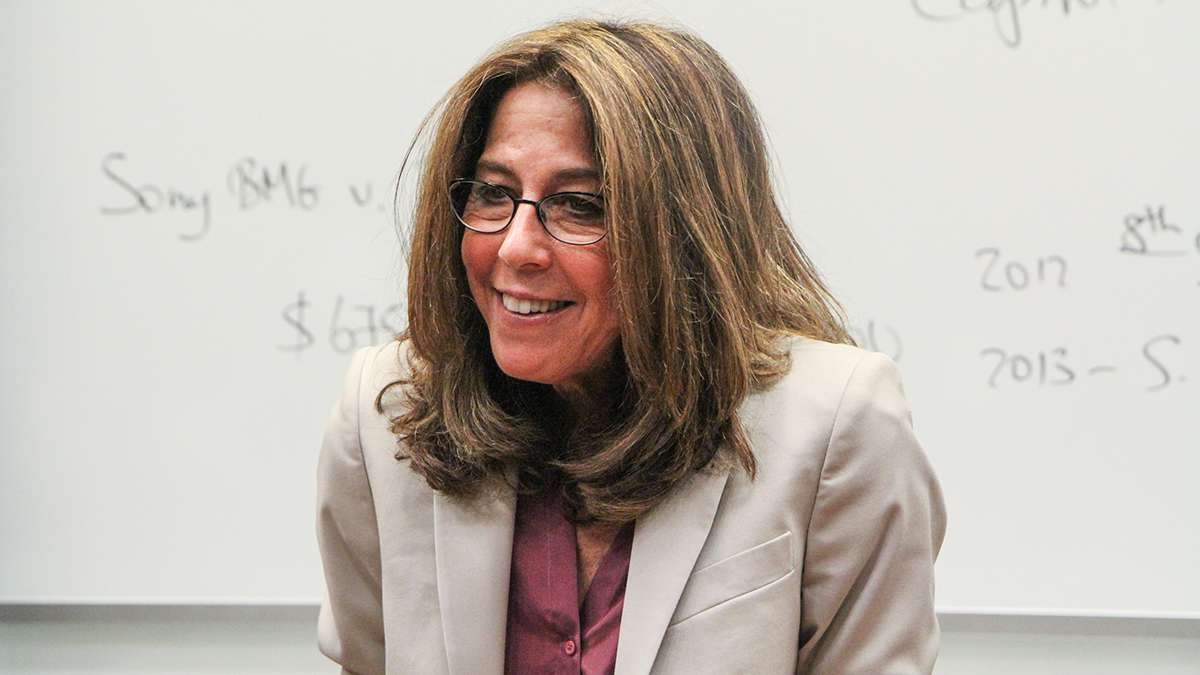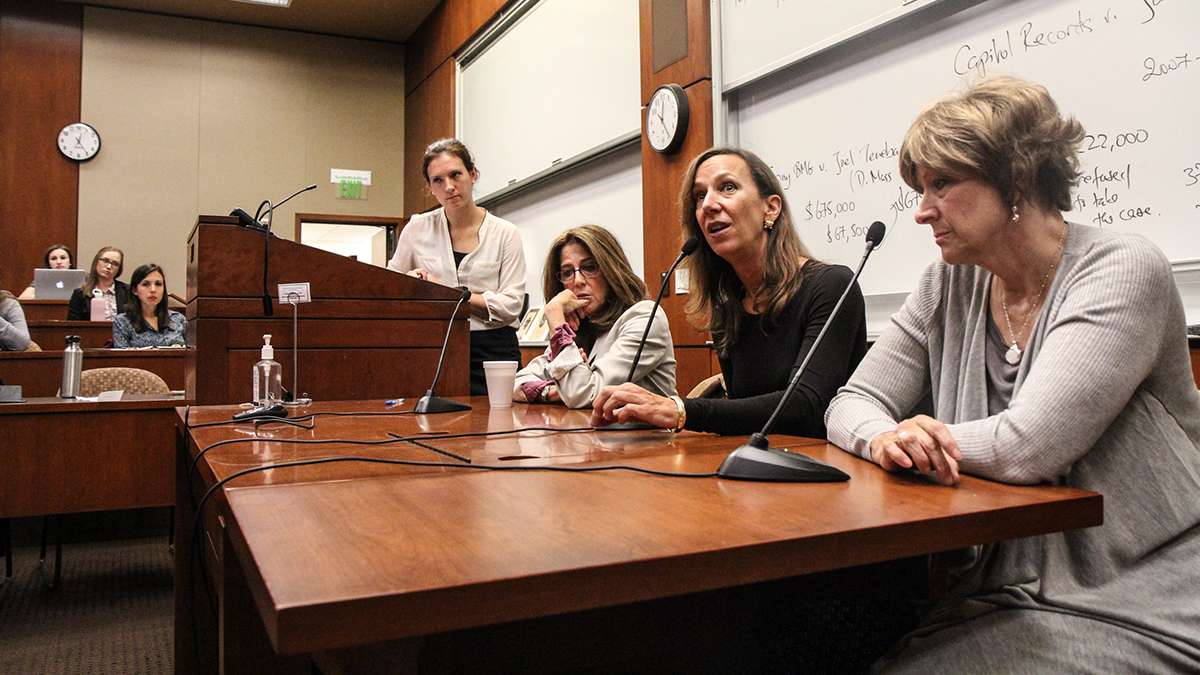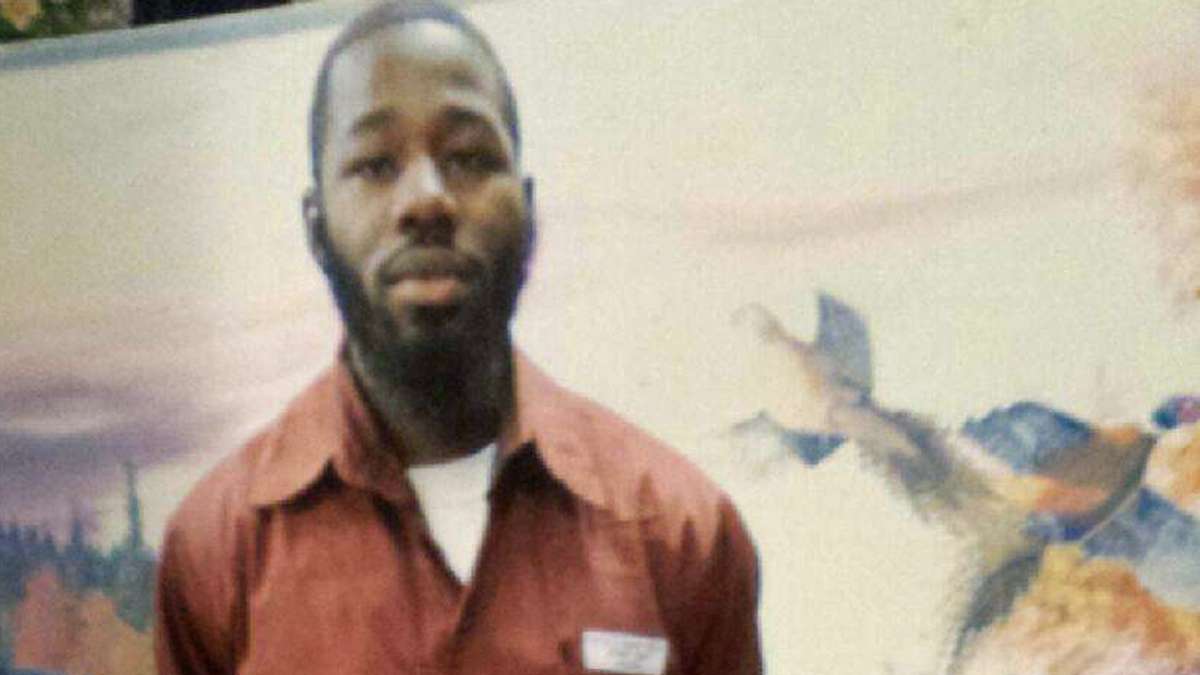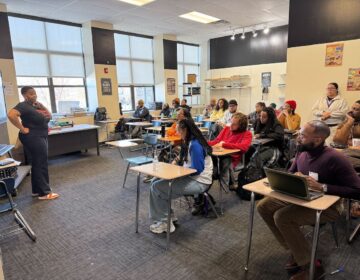For hundreds of inmates who killed in their youth, chance for parole hinges on high court ruling
Listen-

-

-

-

Marsha Levick (third from right) the co-founder of the Juvenile Law Center sits on a panel. (Kimberly Paynter/WHYY)
-

It was Labor Day weekend in 2006, and David Sparks’ block around 18th and Wingohocking streets in the Nicetown section of the city was throwing a party. Music was blaring, people were barbecuing and Sparks and some other teens were gambling with dice.
At some point, the game grew tense and verbal outbursts quickly escalated. It left a 20-year-old man shot dead. The victim was fired at as he was riding away on his bike, court records show. Witnesses said they heard up to ten shots.
Although he and his family maintain his innocence, Sparks was charged and convicted of murder. At his 2008 trial, a judge also found him guilty of carrying without a license and possessing a firearm as a minor.
He was sentenced to life in prison without parole for the act prosecutors say he carried out as a 16 year old.
“He wasn’t a bad child. He decided that he just wanted to test the streets at the time,” said Sparks’ mother, Tameeka Hawkins.
Sparks was in and out of trouble growing up, Hawkins said. But she never thought her son was a coldblooded killer. She said another witness saw someone else fatally shoot 20-year-old Gary Hall, but appeal attempts have been unsuccessful.
“For him to leave me was really heart-wrenching,” Hawkins said. “My heart has been stomped, torn, pounded on. I’m just picking up the pieces now, and it’s been almost 10 years.”
Hawkins and other families of inmates who started life-without-parole sentences as teens are placing their hope into a U.S. Supreme Court case, Montgomery v. Louisiana, that could end up shortening the sentences of hundreds.
It’s a particularly acute issue in Philadelphia, a city that has the largest share of “juvenile lifers” in the country. Some public defenders blame the zeal with which tough-on-crime prosecutors have attacked cases as part of the explanation. Others point to the hysteria in the 1980s over “superpredators,” with highly publicized accounts of rampaging teens portrayed as remorseless and impossible to rehabilitate, that influenced states like Pennsylvania to adopt laws that transferred juveniles offenders into adult court, sending many behind bars on mandatory life terms after murder convictions.
In 2012, the U.S. Supreme Court found that putting teens away for life without the possibility of parole is cruel and unusual, saying their age makes them less culpable and that they deserve a chance to redeem themselves.
But now the nation’s top court will consider whether that ruling should apply retroactively to those, like Sparks, whose sentences predate the landmark decision. In Philadelphia alone, an estimated 300 inmates would be eligible for resentencing should the court rule in favor of the offenders. Including the rest of Pennsylvania, the number of eligible inmates exceeds 500.
“I’m praying that the decision is going to come down in my favor,” Hawkins said. “Not just mine favor, but a lot of teenage boys — men — that’s been there for a very long time.”
Weighing immaturity against accountability
Since the 2012 decision, states have been battling a barrage of lawsuits questioning the automatic life sentences that put some 2,300 teens behind bars around the country.
In Pennsylvania, defendants in homicides are charged as adults, no matter what their age. Consequently, there have been murder cases involving children as young as nine.
“We should not tolerate a justice system in this country that essentially metes out justice on that kind of an arbitrary decision-making process,” said Marsha Levick, deputy director of the Juvenile Law Center.
Levick is part of the legal team that will be arguing in front of the Supreme Court. She says teenagers are less blameworthy for their actions. In other words, the thinking goes, their age alone is a mitigating factor.
“What the research tells us is that they tend to be impetuous and impulsive. Juveniles aren’t thinking about consequences,” Levick said. “That’s one of the reasons why the Supreme Court said that they should be sentenced differently.”
But prosecutors are far less persuaded. Philadelphia District Attorney Seth Williams says victims’ families need to be considered. He says they shouldn’t be revictimized every time there’s a new court decision, because many of them don’t care how old the killer was.
Williams said holding new hearings for the sentenced convicts could put the families of victims through emotional turmoil.
“We have to do something to hold people accountable who commit first-degree murder,” he said, adding that capital punishment for juveniles has “already taken off the table.”
It was legal in Pennsylvania to sentence juvenile offenders to death until 2005, when the U.S. Supreme Court declared that such executions violated the Eighth Amendment ban on cruel and unusual punishment.
Williams said there’s no perfect way to deal with someone who commits a “heinous” murder.
“These aren’t kids in fifth grade doing these things,” Williams said. “We’re talking about killings. Not someone who stole someone’s laptop. We’re talking about the loss of life. And us having to look into the eyes of victims’ families, who want something done.”
Countering that, advocates such as Levick point out that the U.S. is the only industrialized country that has juveniles serving life sentences without parole.
“To the extent that the United States would like to be a leader in human rights, we need to be a leader in criminal justice policy as well,” Levick said.
Rethinking ‘endless sentences’
Some activists say compromise is needed. Jeanne Bishop is a public defender in Cooke County, Illinois. The topic is personal for her, since her sister and brother-in-law were murdered by a juvenile outside of Chicago nearly 25 years ago.
“I think it should be a long sentence, because I think human life is precious, and there needs to be something in equal gravity to that,” Bishop said. “But I don’t think it should be an endless sentence.”
That’s not how she always felt. Bishop was happy to see justice served when the teen who killed members of her family was given a life sentence. But then she reached out to the killer’s family and had a change of heart. She quit her corporate job to become a public defender and turned the transformation story into a book.
“A juvenile life without parole sentence says, ‘It’s endless punishment, and we are never, ever, going to turn back and take a second look at you.’ And we can’t do that to any human being,” she said.
A new report published in the American University Law Review counted 2,341 inmates serving juvenile life-without-parole sentences around the country. Besides Philadelphia, the cities of Los Angeles, New Orleans and Chicago had the largest share of them.
If the Supreme Court agrees that all of those inmates need to be re-examined, giving some of them release dates, it will raise a key question: Will they emerge rehabilitated, or will they find the resources they need to jumpstart productive lives?
For one, Hawkins said, her son has dreams of becoming a teacher. She says it will be easy not mixing with the group of kids he left nearly a decade ago.
“He’s a very mature man,” Hawkins said. “He has wowed me. He’s turned out to be very strong, very intelligent.”
A decision in Montgomery v. Louisiana is expected sometime this term.
WHYY is your source for fact-based, in-depth journalism and information. As a nonprofit organization, we rely on financial support from readers like you. Please give today.




